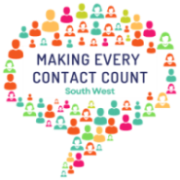Making Every Contact Count (MECC) is simply a chat about health. MECC conversations are person or patient-led, and focus on what a person thinks they may be able to do to make a positive change to their lifestyle. They are often about ‘planting a seed’ for change or supporting someone to make a small step towards making a change.
MECC training focuses on using open discovery questions, which are questions starting with ‘what’ or ‘how’. Open discovery questions allow the conversation to be led by the person and move the conversation away from staff giving solutions or offering suggestions. MECC conversations often end with the person being signposted to the most appropriate support service (e.g. smoking cessation).
MECC focuses on the following areas:
- Improving mental health and wellbeing
- Stopping smoking
- Reducing alcohol intake
- Eating more healthily
- Increasing physical activity
Our vision for Bristol, North Somerset and South Gloucestershire is that all health and social care organisations and relevant partner agencies will be aware of, adopt and embed the MECC principles.
This means that, whenever appropriate, the opportunity to reinforce messages about health and wellbeing and signpost to the relevant services is used.
A MECC conversation is a very brief intervention – no specific knowledge or expertise about the subject area is required. However, staff who deliver more intensive interventions as part of their everyday roles can also use the MECC approach. It can help with opening conversations and supporting people to think about changes that they want to make.
What are the benefits of MECC training?
- MECC offers a long-term approach to prevention, making it a core part of everyone’s work
- An evaluation of the Wessex MECC model (the model that Bristol, North Somerset and South Gloucestershire training is based on) found that staff reported improved job satisfaction, increased professional empathy, and that MECC had had a positive effect on organisational culture
- MECC supports the improvement of service quality and patient outcomes
MECC training
Each BNSSG health and care organisation has a MECC Lead and Trainer(s) who deliver in-house MECC training. Staff should contact their employer’s Learning & Development Team for details of the type of MECC training their organisation offers.
There is also a BNSSG MECC ‘Train the Trainer’ course, this takes place over a day and a half, which trains staff to become MECC trainers and deliver a three-hour MECC training course. Further information is available from the BNSSG MECC Leads (contact information below).
National MECC e-learningWhat about other behaviour change training?
We occasionally receive questions about how MECC fits in with other behaviour change training, such as Motivational Influencing or Health Coaching. Health Education England has created a Behaviour Change Development Framework to help individual staff and managers determine what type of behaviour change training is needed to support people to make positive changes in their lives.
This new Framework demonstrates that there are four levels of behaviour change training, and the recommended level of training depends on the people you or your workforce interact with most everyday.
There are four levels determined by the needs of the people staff work with most:
- Behaviour Change Literacy – suitable for anyone and is accessed via free e-learning on the website
- Behaviour Change Level 1 – Very Brief Interventions, such as MECC, for staff who work with people who have an admin need, e.g. police officer or receptionist who signposts to services
- Behaviour Change Level 2 – Brief and Extended Brief Interventions, for staff who work with service users with a health or social care need and need motivational interviewing skills
- Behaviour Change Level 3 – High Intensity Interventions, for staff who work with service users with more complex needs. Specialist training for example CBT.
The Framework also includes an Assessment tool, where you answer a few quick questions to find out which level of behaviour change training is most suitable for you or your workforce.
If you are interested in training please contact your local MECC lead:
- Bristol – Elizabeth Lebreton
- North Somerset – Kate Blakley
- South Gloucestershire – Claire Rees

